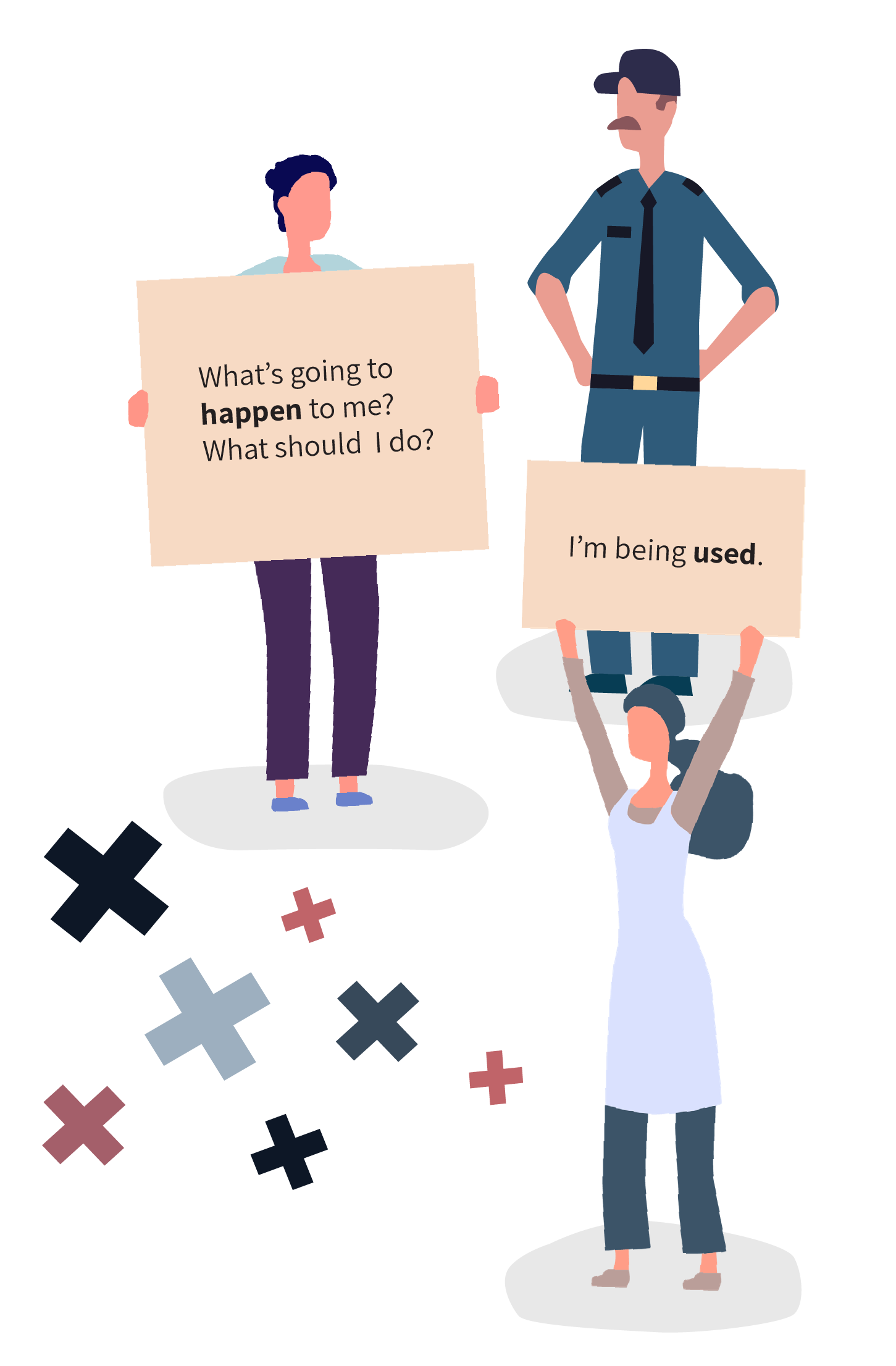“Hi, how’re you doing?”
Mack Chapman smiles and waves at a student entering the doors of Chapin Hall. It’s 2 a.m., and as usual, he is at the security guard’s desk in the small lobby of the dorm.
Having started his shift a few hours ago, he’s seated in a black swivel chair, which the Chapin residents have affectionately deemed “Mack’s Chair.” It is where he’ll remain for most of the night. Chapman is not a small man, and he fills both his seat and the lobby with his easygoing presence.
It’s Chapman’s habit to ask anyone who walks into Chapin how they are, and frequently there’s someone standing in the lobby chatting with him about their day. He knows the names of nearly all of Chapin’s 62 residents and is Facebook friends with those who use the platform. That way, he can message them with well wishes on their birthdays and tell everyone to stay safe over breaks. Some of his favorite memories of Chapin include attending shows and political rallies to support the residents.
“I began to vibe with Chapin, and Chapin began to vibe with me,” Chapman says. “I don’t know, it was just a match made in heaven ... It was kind of hard to describe: [Chapin] became like family to me, like my second family or something.”
By the end of March, however, there were signs that Chapman would not be able to remain as Chapin’s security guard for long. The number of residents in Chapin dwindled as the campus began to shut down due to the coronavirus; even the campus Burger King (known for its long hours) was beginning to close early.
Chapman and his coworkers foresaw that it was only a matter of time until their services would no longer be needed. But as circumstances kept changing, they weren’t sure which day would be their last.
On April 12, that date finally arrived. After working at Northwestern for 10 years, Chapman was laid off.
“They don’t treat us with respect”

Chapman is one of hundreds of Northwestern service workers who have lost their jobs since the start of the pandemic. Service workers make up the majority of the staff that help the campus function in a non-academic context, including dining, housekeeping, maintenance and security.
Most of these workers are not directly hired; instead the University contracts with an outside company that sources service employment. Due to reduced campus operations, Northwestern furloughed a majority of its contracted workers in an effort to reduce anticipated financial shortfalls, which the University estimates to be about $90 million for the 2020 fiscal year.
Additionally, on May 11, an email from University President Morton Schapiro announced that the University decided to furlough 249 staff members who are unable to “substantially perform their duties remotely or who support areas with significantly reduced workloads in the wake of the pandemic.”
Despite fiscal pressures, in another April 16 email to the Northwestern community President Schapiro expressed that the University administration believes “we have an obligation to help vulnerable members of our academic community and our larger community,” referring in part to Northwestern’s dining workers.
This email reinforced a commitment made in a March 30 University statement entitled “Supporting Dining Workers.” The email stated that Northwestern had partnered with Compass Group (the dining workers’ employer) to use the federal relief package to ensure that all hourly food service workers receive benefits and compensation equal to what they would have received were they working full-time spring quarter.
“By doing this, we can collectively ensure that our partners are financially whole through the end of the academic year in June,” Craig Johnson, Senior Vice President for Business and Finance, wrote in the email.
Problems have arisen, however, from what these emails left unsaid. While University spokesman Jon Yates wrote that the University is working on a case-by-case basis to minimize the impact for contracted workers from different vendors, Northwestern’s public statements have only explicitly mentioned dining workers, excluding other areas from security to housekeeping.
The definition of “financially whole” also remains ambiguous. Thus far, the University has extended these benefits to dining workers through June 30. As of mid-April, the University also began to provide the approximately 35 dining workers still employed on campus with premium pay: a few dollars more per hour than the normal rate. According to Yates, when combined with state unemployment benefits and funding from the federal coronavirus relief bill, the compensation will more than equal what most Compass Group staff received while working.
But to many dining workers and their union, UNITE HERE Local 1, that has not been the case. To them, remaining “financially whole” means closing any gap in income due to circumstances brought by COVID-19, by one-time check or other compensation methods. As of May 18, UNITE HERE Local 1 and the workers it represents say they have yet to see this gap closed for some workers.
Most dining workers were laid off in mid-March; months have elapsed since their last paycheck. For many workers, unemployment checks have been slow to arrive or have yet to arrive at all. Others do not even qualify for unemployment benefits.
UNITE HERE Local 1 lead research analyst Noah Carson-Nelson says dining workers earned about $15.64 per hour on average.
“If you’re not living paycheck to paycheck, you’re living pretty close to it,” Carson-Nelson says. “Workers can’t afford to stay home and follow orders without being able to pay rent, feed families and all the things that come with an income.”
Valentina Espinosa, a former housekeeper at Kellogg School of Management’s James L. Allen Center, was laid off on March 20. As a union shop steward— elected by fellow workers to represent them in dealings with management— Espinosa says she’s received calls from coworkers saying they haven’t received unemployment benefits.

“For now, it's very simple for [the University and Compass Group]. They say ‘Oh, you are making money from the unemployment benefits, and it’s not true because some of us are not making money,” Espinosa says.
Compass Group Director of Marketing Georgene Sardis says Compass Group has been working with workers whose unemployment applications were declined, and they have been aware of statewide delays. She also says Compass Group provided a grocery box of at least two weeks’ worth of groceries to each Compass Group worker laid off and established a grocery relief program that lasts through spring quarter.
Espinosa says she’s dissatisfied with how communication with Compass Group and the University has been. Carson-Nelson says the union did not receive any communication about the University’s commitments other than public statements. And while Compass Group has been in talks with the union about how to compensate workers, weeks have passed without the gap in income bridged.
“I feel really happy with my students … I feel very happy to serve them,” Espinosa says. “But I don’t feel happy with the company; I don’t feel happy with the University because all the time they look [at] us like we are nothing. They don’t treat us with respect. They [are] just using us.”
A national struggle
Service workers’ plight at Northwestern reflects some issues plaguing the country since the pandemic’s onset.
The sudden influx of unemployment insurance claims have swamped state offices, delaying unemployment checks in numerous states. Industries such as food services are among those hit hardest by the pandemic.
In April, the U.S. unemployment rate hit 14.7 percent, the highest level since the Great Depression. A report from the Bureau of Labor Statistics revealed that by race and ethnicity, Blacks and Hispanic Americans saw the highest percent unemployment rates. According to Carson-Nelson, 36 percent of Compass Group workers identify as black, while 45 percent of workers identify as Latino.
“I think it’s clear that people who are already at higher risk for poverty and sickness are being affected by this pandemic disproportionately, particularly in Chicago and the surrounding area,” Carson-Nelson says. “Given the demographics of the Compass Northwestern workers, we have to pay special attention to those in our community who need the most help right now.”
Espinosa started receiving compensation from the unemployment office on April 8, about two and a half weeks after she was laid off. While it's enough for her and her daughter to get by, she is unable to send as much money as she used to to her relatives in Colombia, who are in a similar situation: out of work and stuck at home.
“The unemployment office [says] until July 25 we have extra money,” Espinosa says. “But after that, I don’t know [what’s] going to happen with me. I don’t know if the unemployment benefits [are] going to support me until next year because I don’t have a lot. So probably, [I’m] going to spend all my money now, in this time, because I need to [pay] my lease. So I don’t know what’s gonna happen in my future.”
Standing up
Incensed after hearing about Chapman’s furlough, Chapin residents came together to advocate for his rehiring in the fall. The student executive board put together an email campaign directed at University administrators, calling Chapman a “dear friend” and urging for a commitment to rehire him and other furloughed service workers.
Every year, the board emails the administration to ask for Chapman’s continued stay. Their most recent email emphasized Chapman’s constant friendly presence, which made Chapin “like home” to many residents. He hand-wrote and photocopied a playlist naming more than 40 of his favorite songs, entitled “Mack’s Music Selection,” to give residents. When the pandemic gained traction in Illinois, he reminded residents to be careful, showing them the yellow utility gloves he’d been wearing.
“Mack is just part of Chapin, and it’s just really clear,” says Chapin President first-year Kendall Clark. “He’s a part of our family. Regardless of what [the executive board] had to say, people were gonna advocate for him.”
While other Northwestern service workers may not have such a personal community of student support, they're backed by a similarly dedicated organization: Students Organizing for Labor Rights (SOLR).
On March 13, just two days after the University announced it would hold at least part of spring quarter remotely, SOLR started an emergency fund for service workers. Since then, the fund has amassed over $20,000. They’ve sent four rounds of profit distributions to workers who have indicated need and are planning to continue fundraising and distributing.
SOLR also partnered with UNITE HERE Local 1 to hold virtual rallies on Facebook Live and call-ins to University administrators to raise awareness of workers’ situations and demand that the University provide workers with compensation.
“The biggest thing for me that got me to get seriously involved [in SOLR] this year was the irony of this whole situation,” SESP fourth-year Elijah Beal says. “Not just the pandemic, but just overall Northwestern’s treatment of workers. These people are on the front lines keeping this campus safe and clean and feeding people at work, but then they struggle to feed their own families.”


“ These people are on the front lines keeping this campussafe and clean and feeding people at work, but then theystruggle to feed their own families.” ELIJAH BEAL , SESP fourth-year
SOLR has also been using social media to raise awareness about workers’ situations. An April 29 Instagram post calling on students to tag Northwestern and urge the University to do right garnered more than 400 comments and over 800 likes— 650 more than their previous most-liked post.
“More and more people are sharing our content on social media. More and more people are participating in our fundraisers. So I feel really good right now about the momentum that we’re building,” Beal says. “It’s just a matter of ‘Can we get these people to continue working with us, and can we get enough students to put a significant amount of pressure on the administration?’ … I’m still worried, but I’m very optimistic that we will garner enough support to make some serious changes.”
Carson-Nelson of UNITE HERE Local 1 emphasized student involvement as a critical source of support: “I think it’s really important that students get involved with this...we can’t win progress for service workers without student allies and student support.”
In addition to students, faculty have also been working to promote the welfare of Northwestern’s service workers. On April 18, African American Studies and History Professor Martha Biondi penned an open letter to the University with support from almost 90 faculty members. Biondi wrote in an email that in the letter, she asked the administration “to make good on their pledge to make all food service workers ‘whole’ through the end of Spring Quarter.”
Lois Hedman, the president of Northwestern’s Faculty Senate, says she is “continuing to engage with the administration” about service workers’ compensation.
“I believe that the faculty who wrote the letter were heartened to hear that Northwestern seeks to take care of its employees during this difficult time,” Hedman says. “However, these faculty's current concern is whether continuation of benefits and comparable compensation actually happened ...The faculty strongly feel that all food service workers, not just most of them, deserve full pay and benefits for spring quarter.”
But what will happen after the end of spring quarter — and after July 25, the current date that the federal coronavirus relief bill ends for Illinois’ unemployed workers — remains uncertain.
Espinosa says even if she can return to work at some point, she fears business will be close to nonexistent for her. The Allen Center where she worked as a housekeeper typically hosts many guests who are typically visiting from other countries. But right now, the United States has one of the most severe COVID-19 situations worldwide.
Even if she were to go back to work, Espinosa worries about whether Compass Group would offer her and other workers proper protection.
“The last day that I work, we don’t have mask to [wear],” Espinosa says. “Around 2 or 3 days before [I] finish my job, we don’t have mask, we don’t have hand sanitizer, we don’t have protective gloves for cleaning. So we are put in risk when [we] are going back.”
Chapman, too, was concerned about his safety during his last few weeks of work at Northwestern.
“I’m an essential worker, I guess, but here I am transporting myself to work via public transit and everybody else is gone,” Chapman says. “That, and watching the news reports and everything, was just frightening. Every time I went out, I was scared, I was just nervous. I had my mask on, I had my gloves on and everything, hand sanitizer and alcohol. But it’s just the thought that that virus could be anywhere, and that in and of itself is scary.”
Chapman’s employer, Allied Universal, was able to find him a job at another site: the Jewel-Osco main warehouse distribution and shipping center in Melrose Park.

The warehouse, immense and mechanical, seems worlds away from the cozy lobby of Chapin. Oversized trucks come in and out, day and night, their flow second only to the hundreds of people crossing in and out of the complex at all hours. He’s been working there for several weeks, but it’s a temporary gig until his employer finds him another position in June.
Chapman is optimistic that a semblance of normalcy will return by fall. Once restrictions are lifted, he wants to travel, head back to New York City or Miami. A self-proclaimed Marvel fan, he also plans to watch "Black Widow" in theaters. He hopes that by September, he can return to his famed seat at the security desk in Chapin’s lobby.
“Hopefully, if things get back to normal and classes resume and things like that, whenever that may be, hopefully we’ll be able to get back to normal,” Chapman says. “And I’ll be able to come back.”
